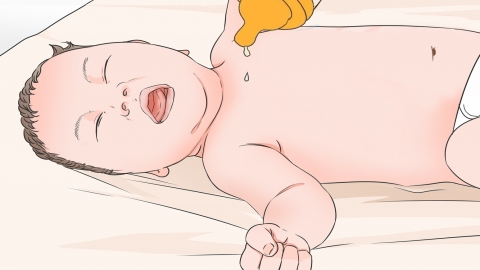What should I do if my baby over two months old has diarrhea?
Diarrhea generally refers to loose or frequent bowel movements. Diarrhea in a two-month-old baby may be caused by improper feeding, an immature digestive system, lactose intolerance, allergic reactions, bacterial enteritis, and other factors. Management should be based on the specific situation. It is recommended that parents promptly take the baby to the hospital for diagnosis and follow medical advice for appropriate treatment.

1. Improper feeding: Inappropriate feeding methods can disrupt the baby's intestinal environment and affect normal digestive function, leading to diarrhea. Parents should prepare formula according to the correct ratio and avoid frequently switching brands, allowing the baby's gastrointestinal system time to adjust. For babies already on complementary foods, introduce new foods gradually.
2. Immature digestive system: The digestive system of a two-month-old baby is not yet fully developed, and insufficient secretion of digestive enzymes can easily lead to indigestion and subsequent diarrhea. Parents should appropriately adjust the baby's feeding method, following the principle of small, frequent meals to reduce the burden on the digestive system.
3. Lactose intolerance: Babies may be unable to fully digest lactose in dairy products due to a lack of lactase, leading to diarrhea. Temporarily switch to a low-lactose or lactose-free formula, and gradually reintroduce regular formula after the intestines have recovered.
4. Allergic reaction: Babies may have allergic reactions to certain food components, such as cow's milk protein or soy protein, which can cause diarrhea, possibly accompanied by symptoms such as rash or difficulty breathing. At this time, discontinue the suspected food immediately. If necessary, follow medical advice to administer medications such as vitamin C tablets, boric acid zinc oxide ointment, or butyl flufenamate ointment to relieve discomfort.
5. Bacterial enteritis: Bacterial enteritis is usually caused by bacterial infection. The bacteria and their toxins damage the intestinal mucosa, leading to diarrhea, which may be accompanied by high fever, abdominal pain, blood in the stool, and other symptoms. It is recommended to use medications such as amoxicillin granules, lactobacillus tablets, and bismuth potassium citrate tablets under a doctor's guidance to improve symptoms.
Parents should closely monitor the baby's physical condition and maintain good personal hygiene, washing hands frequently to prevent cross-infection.





